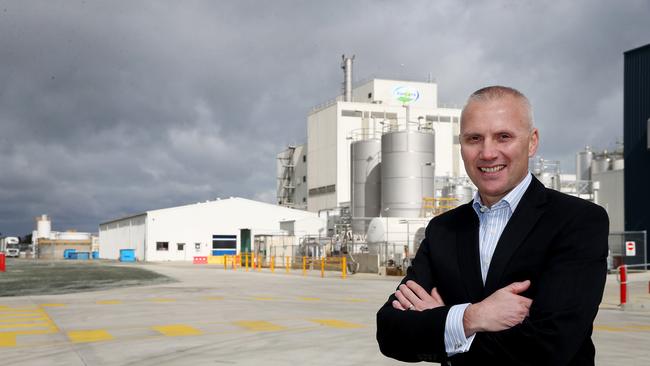Fonterra mulls IPO of Australian dairy business as NZ expands
Sixteen years after Fonterra took over Victorian milk processor Bonlac, the NZ co-op is considering selling its Australian business.

Fonterra is mulling an IPO of its Australian arm, leaving it to become a predominantly domestic-focused business while its New Zealand operations would continue to export around the globe, including to China.
The proposed IPO could value Fonterra’s Australian business at more than $1.2bn, based on earnings before interest and tax of $NZ74m – a 37 per cent increase on the previous year. This would put its potential market capitalisation not far behind Bega Cheese’s $1.6bn.
It comes as China has targeted a range of Australian soft commodities, from barley and beef to wine and lobsters, with trade bans or tariffs. The trade skirmish has prompted companies such as A2 Milk, which is dual-listed on the ASX and NZX, to highlight their heritage in New Zealand, which has avoided China’s wrath.
Fonterra, the world’s biggest dairy exporter, is pumping up its New Zealand operations too, unveiling a strategy on Thursday to “differentiate New Zealand milk further on the world stage, with the aim of getting more value”.
This strategy includes a ownership review of its Australian business, including a possible IPO, and exiting Chile altogether.
China is Fonterra’s biggest single-country revenue driver, with sales leaping from $NZ5.2bn to $NZ6.1bn in the past 12 months. Fonterra’s total full year revenue was flat at $NZ20.57bn.
“There is a reliance to some extent on that China market,” Fonterra Australia managing director Rene Dedoncker said.
“And that’s where I think we’re seeing that geopolitical play, and the New Zealand government is doing what they need to keep the corridors open with China.”
But Mr Dedoncker said focusing on the New Zealand milk pool was about adopting a greater focus on provenance, which is attractive to not only the Chinese market but also other countries.
“Also what you‘re seeing … is a strategy around provenance, sustainability and nutrition science to the world from New Zealand.
“They (Fonterra New Zealand) will continue to deal with China. Of course it’s an important market. The market share will grow, effectively, and so they’re conscious of that. It’s that sort of duality of supporting the country, but also acknowledging that we need to be able to get into more markets and be attractive to more markets.
“New Zealand is very focused on that. And I think their sustainability and provenance story is very attractive to the hundreds of markets that they export to.”
Before Beijing’s trade stoush with Australia, Australia was also hailed as a clean and green food producer and held in high regard by Chinese consumers. Beijing was angered by Prime Minister Scott Morrison’s push for an inquiry into Covid-19’s origins last year, the introduction of foreign interference legislation and more recently Australia’s partnership with the US and Britain to build nuclear submarines.
Fonterra’s Australian operations – which began 16 years ago after it took over beleaguered Victorian milk processor Bonlac to expand its empire across the Tasman – have steadily become more domestic-focused.
Mr Dedoncker said this was a strategy to produce more stable earnings by moving more into consumer ingredients and brands, which include Western Star and Perfect Italiano, and shifting away from the extreme volatility of global dairy markets.
“We’ve been very deliberate to grow a domestic business. More than 70 per cent of the milk that we collected from farmers stays here in those iconic brands,” Mr Dedoncker said.
“When we do export, it’s very deliberate. We are equally spread amongst many markets; we do not have a bias to China. They are an important market and we will partner with customers that go there but similarly we don’t have a reliance on them.
“Japan is a huge market for us, as is Korea and all through South-East Asia. We’re not playing significantly in commodities, when we’re talking about value add and in that portion that we do export, we’re quite distributed, and our risk is spread amongst many countries.”
Fonterra Australia’s earnings before interest and tax rose 37 per cent to $NZ74m in the past year.
Chairman Miles Hurrell said under the proposed IPO, Fonterra would retain a “significant stake” in its Australian operations. It was “one option” being considered as part of a broader review.
“By having access to ongoing external capital, we believe the Australian business will be best placed to deliver on its strategy and capture its full potential, at the same time as unlocking capital for the Co-op.”
Since Fonterra launched in Australia, there has at times been tension between Fonterra’s New Zealand farmer owners and its Australian suppliers. This was particularly felt during Murray Goulburn’s ill-fated foray onto the ASX, with the company “overpaying” farmers for milk to meet its prospectus targets.
Fonterra was forced to match Murray Goulburn’s inflated milk price under the Bonlac milk supply agreement at a time when global dairy prices were falling and its New Zealand farmers were being paid far less. Murray Goulburn collapsed in 2016, with Canada’s Saputo buying its assets two years later.




To join the conversation, please log in. Don't have an account? Register
Join the conversation, you are commenting as Logout